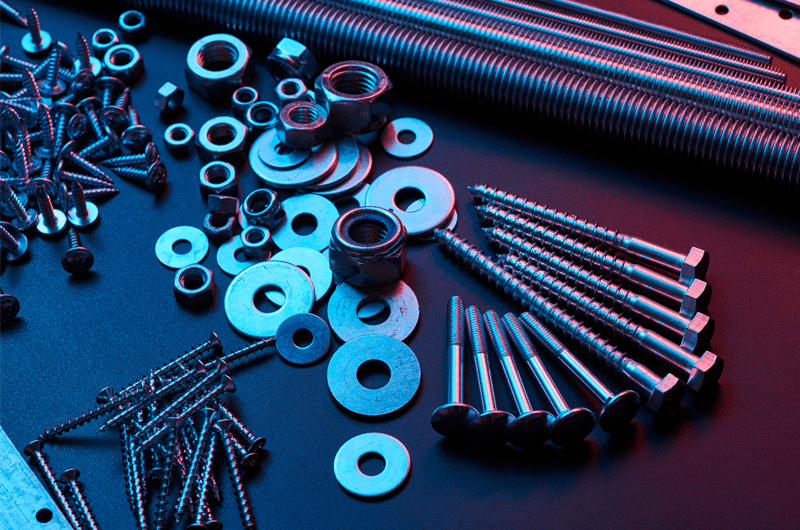Automotive fasteners play a critical role in safety, durability, and vehicle integrity. At Associated Fastening Products, we support automotive manufacturers, engineers, and procurement teams with a full range of automotive fasteners that are specially designed for reliability, consistency, and performance. We are proud to provide automotive fasteners that meet demanding industry standards while supporting efficient sourcing and consistent quality.
Discover more about our product portfolio, which includes automotive nuts, bolts, screws, and specialty fasteners used across structural and mechanical assemblies.
Types of Automotive Fasteners
Choosing the right fastener type depends on joint design, vibration exposure, service requirements, and assembly methods. At Associated Fastening Products, we’re happy to help you find an application-specific fit instead of relying on a one-size-fits-all solution.
Several common types of automotive fasteners we can provide include:
- Nuts. Automotive nuts pair with bolts to secure assemblies and may include locking features to resist vibration and loosening over time.
- Bolts. Automotive bolts are commonly used in structural and load-bearing applications such as frames, suspension systems, and engine components, where high strength and precise torque control are required.
- Screws. Fasteners such as machine screws and thread-forming screws are often used in interior components, trim, and lightweight assemblies.
- Studs. Studs deliver consistent clamping force and are frequently used in exhaust systems, cylinder heads, and other high-temperature environments.
- Washers. Washers distribute load, protect surfaces, and improve joint stability in automotive assemblies.
Materials Used for Automotive Fasteners
Automotive applications require materials that can withstand vibration, load stress, temperature changes, and environmental exposure. As you choose your materials, think about compatibility with mating components, required coatings or surface treatments, and long-term performance expectations.
Material options you can choose from for your car fasteners range from stainless steel to brass and various alloys:
- Alloy steel. Offers higher tensile strength and fatigue resistance, making it suitable for drivetrain components and high-load assemblies.
- Stainless steel. Provides corrosion resistance for exterior, under-hood, and moisture-exposed environments where durability and appearance matter.
- Carbon steel. Commonly used for automotive bolts and nuts that require a combination of strength, consistency, and cost efficiency, especially in structural and chassis applications.
- Brass. Used in applications requiring electrical conductivity, non-sparking properties, or resistance to corrosion in specific environments.
- Specialty alloys. Selected for lightweight designs, extreme temperature exposure, or specialized performance requirements that exceed standard material capabilities.
Fasteners for Race Cars and High-Performance Vehicles
Race cars and high-performance vehicles place significantly higher demands on automotive fasteners due to extreme operating conditions and weight requirements. Here’s how our fasteners can support vehicle builds and performance needs:
- High vibration resistance. Fasteners need to maintain clamping force under constant vibration and dynamic loading without loosening.
- Precision tolerances. Tighter manufacturing tolerances support consistent torque application and predictable joint performance.
- Lightweight construction. Specialized alloys and designs help reduce overall vehicle weight while maintaining required strength.
- High temperature tolerance. Components that sit near engines, exhaust systems, and braking assemblies need materials and coatings that perform reliably under heat.
For many racecar applications, fasteners also include quick-release mechanisms, which enable easy replacement and changeouts.
Contact Associated Fastening for Automotive Fasteners
Whether you’re sourcing standard auto fasteners or specialized automotive nuts and bolts, Associated Fastening Products is here to help you with technical expertise and reliable supply to support automotive production and performance applications. Contact our team to discuss your requirements or request a quote to get started.

